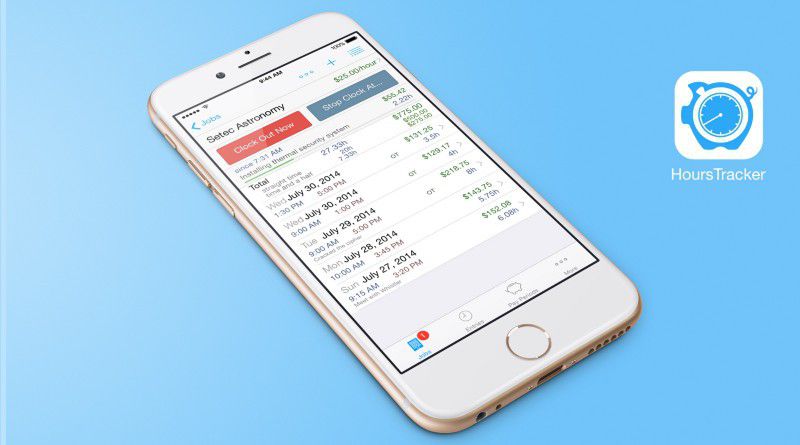6 Years Ago, A Developer Made An App To Track Time. He Now Makes 5 Figures A Month From It
Insights from an indie app developer who made it big in the App Store.
When Carlos was working as as Senior .NET Developer, his boss encouraged him to "absolutely write some iPhone apps!" This was early 2009, Carlos recounts in a recent Medium post.
The boss, who is unnamed in the Medium post, had just read about Ethan Nicholas, another developer, who struck it rich by releasing a lite version of his game, iShoot. The boss told Carlos, "Ethan wrote this game without knowing any Objective-C before, and he was able to quit his job. You should give it a try."
"Part of me wondered about my boss telling me I should quit my job, but I really appreciated the encouragement to try new things," Carlos recalls. "I thought it over for a few days and started to believe it could happen. I began reading about Objective-C, the iPhone SDK, and the design guidelines."
When Carlos's wife, who had an iPhone, couldn't find a good app to keep track of her hourly job, he offered to make one. He borrowed her iPhone, and on 12 July 2009, released HoursTracker.
Lifehacker picked it as the best time tracking app for iPhone. Apple made a short video about it, and for a while HoursTracker was more popular than even Angry Birds.
It's been 6 years since then, and he is still working on making HoursTracker better. His app makes more money than he could earn with a full-time job. Carlos says, "I made what I thought was a decent product, put it up for sale, and then I made it better."
"I didn’t know anyone in the press, my app was never on the App Store front-page, and nobody in the community had ever heard of me. That stuff helps, I’m sure of it, but it isn’t the only path to success.
The App Store is an amazing thing. Sure, there’s lots of room for improvement, but it was the first of its kind and the impact has been incredible. It has changed a lot of lives, mine included."
While his story is unique, Carlos offered a few pointers for aspiring app developers. First of all, he made the app originally because his wife had a particular need.
“When she couldn't find a good app to keep track of her hourly job, I volunteered to build a great one for her. I had about fifteen years of programming experience at the time; how hard could it be?” So, lesson one, pick a well-defined problem that is actually causing pain for users.
forbes.comSecond, Carlos has continued to refine the app over time and again, not just update it for new versions of iOS.
Engineering a problem is important to user satisfaction, as long as you don’t overload your app with features. IA Writer (now IA Writer Pro) is a great example of an app that was originally beautiful and minimalist, but became overly complicated with unnecessary elaborations.
forbes.comThird and most important, Carlos, who views advertising as a necessary evil, has a clear and fair freemium model. Freemium is a pricing strategy by which a product is provided free of charge, but money is charged for proprietary features and functionality.
The free version of HoursTracker has ads, which bring in 10% of the app's revenues, but that situation isn't ideal.
"I know I’ve done a great job when the user spends the least amount of time in my app and yet still tracks their time accurately. That’s not good for an ad-supported product. So, if I’m trying to make more money from ads, then I’ll be working against my customer’s needs and thus my own best interests."
Reasoning that ads or lack of ads don't spur upgrades, Carlos prompts consumers to pay for the premium version by offering more functionality. With the free version, you can track up to three jobs and 21 days of entries. A message on HoursTracker tells users than can store up to five jobs with the Personal version ($4.99) or an unlimited number of jobs with the Pro version ($8.99.)
"The message tells users they can erase their existing data to start the 21-day cycle again and "continue to use the free edition until you're ready to buy." As he explains, "this language creates an understanding that you’re expected to buy the app if you’re satisfied with how it works for you."
"Some people install the app, experiment with it briefly, and know pretty quickly if it suits their needs or not. Others choose to live with it for a few weeks and make their decision slowly, often trying several apps simultaneously. The goal is to make sure the app is a known quantity, just like that morning coffee, before making a purchase decision."
You can use the free app for up to three jobs and store three week’s worth of data. So if you only have to track three jobs at a time and can make due with dumping your data every three weeks, you can use HoursTracker indefinitely for free.
Ribas has figured out over the years that this is a winning formula. If someone uses the app for three weeks and it works for them, odds are five or nine dollars will not seem like a lot of money to spend for the added convenience and peace of mind for retaining data.
As Forbes notes, there's an important principle here related to human behaviour
Asking a customer for money after they have been happily using your product for three weeks is easy. Asking the same customer for the same amount of money up front is hard. Easy wins over hard. And it is interesting that the same dynamic obtains to asking users for permissions within apps in iOS.
forbes.comMeanwhile, Carlos also advises to experiment with pricing
"Try a price reduction promotion to see if a lower price yields more revenue. If you can stomach it, let the discounted price stand long enough to get a feel for network effects. Try the opposite — check if increasing the price works better."
medium.comWhile Carlos says the success of his app flies in the face of claims that no one makes money off apps anymore, Mashable reports that few people claims that Carlos had an advantage because he released the app in the early days of the App Store
"Yes, it is still possible to make money, even a lot of money, writing an app but that doesn't mean early adopters didn't have a big advantage," wrote one. Others pointed out that HoursTracker shows up high in App Store searches, giving it a leg up over new competitors.
"I have a similar app, onsite time tracker, and it makes way less. like a few hundred dollars per month," wrote another. "I have always been curious how much Hours Tracker makes. It dominates the app store searches."
In the end, as Carlos notes, if you can solve an important problem in a way that resonates with a sizable group of people, you can find success. "There's always room for a fresh take on an already well-served problem, too."
2014′s @appfigures summary says it was a pretty good year for my apps. Bring on 2015! pic.twitter.com/imoEEEHfT9
— Carlos Ribas (@cribasoft) January 1, 2015
"Every app idea is different, but with the right mix of passionate execution, deliberate strategy and agility, I think indie developers can thrive in today’s App Store."
medium.com

